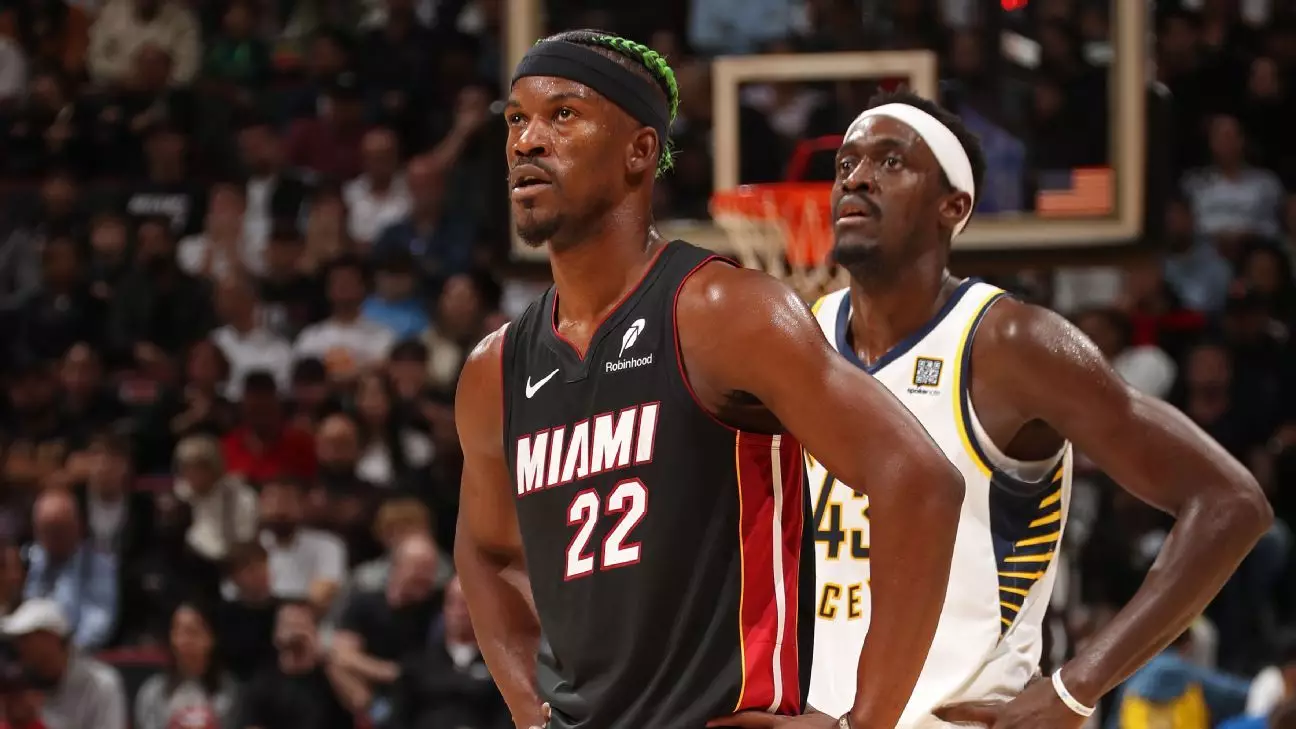The relationship between Jimmy Butler and the Miami Heat has taken a surprising turn as the six-time All-Star reportedly seeks a trade from the franchise. According to league sources, Butler has conveyed his desire to explore opportunities outside of Miami but has not specified any preferred destinations. This openness to relocation indicates a significant shift in his stance as he aims to reclaim his passion for the game while believing he can transform any team into a contender. This announcement raises eyebrows, especially as Butler maintains his commitment to participating in team activities amidst what may soon become a contentious trade saga.
Recent performances may provide insights into Butler’s current mindset. Scoring a mere nine points in the Heat’s 128-115 loss to the Indiana Pacers, he openly expressed his discontent with his basketball experience in Miami. Commenting on the loss, Butler stated, “I want to see me getting my joy back playing basketball. Wherever that may be, we’ll find out here pretty soon.” The disparity between his off-court happiness and on-court struggles reflects the complexities of being an elite athlete weighed down by expectations and unfulfilled ambitions.
Butler’s recent statements reveal a deep-rooted emotional struggle. His admission that he probably cannot regain his joy while still with the Heat sends a stark message about the current state of his relationship with the franchise. It highlights the need to address not only performance metrics but also athlete mental health and fulfillment.
Reports indicate that Butler’s frustration was exacerbated by comments from team officials suggesting he wasn’t giving his all in recent games. Particularly after a game where he managed only five shots in 25 minutes, Butler found himself defending his competitiveness, stating, “You won’t say I’m not out there playing hard.” This critical moment showcases a breakdown in communication between the player and the organization, an essential component for any successful team. A lack of clarity regarding Butler’s contributions and expectations seems to have initiated this chain of events, signaling a need for improved dialogue and trust within the franchise.
Furthermore, the tension has been brewing since last spring when team president Pat Riley announced that the Heat would not extend Butler’s contract before the 2024-25 season. This decision left Butler in limbo about his future with the team, particularly given that he could have secured an extension worth over $113 million. The fallout from that announcement continues to linger, highlighting how leadership decisions can impact player morale and decisions significantly.
The Heat’s front office, adamant about retaining Butler, has reportedly engaged in trade discussions but has seen little progress. Riley even dismissed reports of Butler’s trade preferences publicly, emphasizing the team’s commitment to keeping him. However, the disparity in intentions raises concerns—while the Miami Heat hopes to maintain a strong roster, Butler is vying for an environment that reignites his joy in the game.
As Butler approaches the end of his $49 million contract with the possibility of a $52 million player option for the following season, the stakes grow higher for both parties. Reports suggest he may likely decline the option, intending to enter free agency, which poses strategic dilemmas for the Heat. Will they be willing to gamble on retaining him for another season, or could they look to capitalize on his market value in a trade?
Despite the uncertainty looming over Butler’s future, his determination remains evident. Averaging 18 points, 5.7 rebounds, and 4.7 assists while shooting a commendable 55.3% this season showcases his caliber as a player. However, his evident frustrations could either energize him to make a significant impact in the second half of the season or lead him to seek a more favorable platform to demonstrate his talent.
In navigating these tumultuous waters, both Butler and the Heat must prioritize open communication. Establishing a mutual understanding regarding expectations, roles, and future aspirations will be vital to either resolving their differences or facilitating a trade that respects both the player’s desires and the team’s ambitions. As the NBA season unfolds, how Butler’s grievances are addressed will set the tone for both his career trajectory and the Heat’s future endeavors. The resolution may redefine not just roles within the organization but the broader landscape of team dynamics and player agency in the ever-evolving world of professional basketball.


Leave a Reply